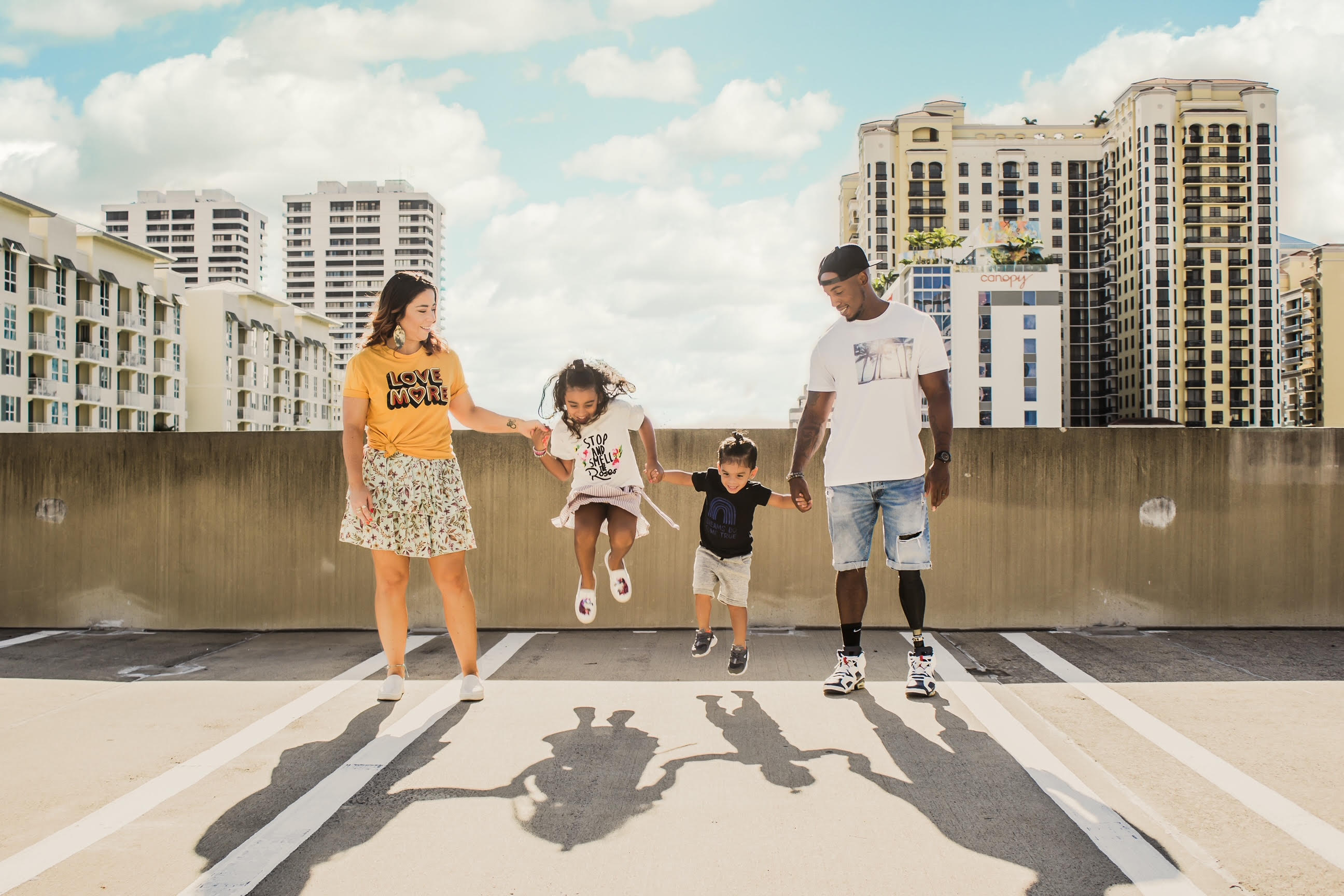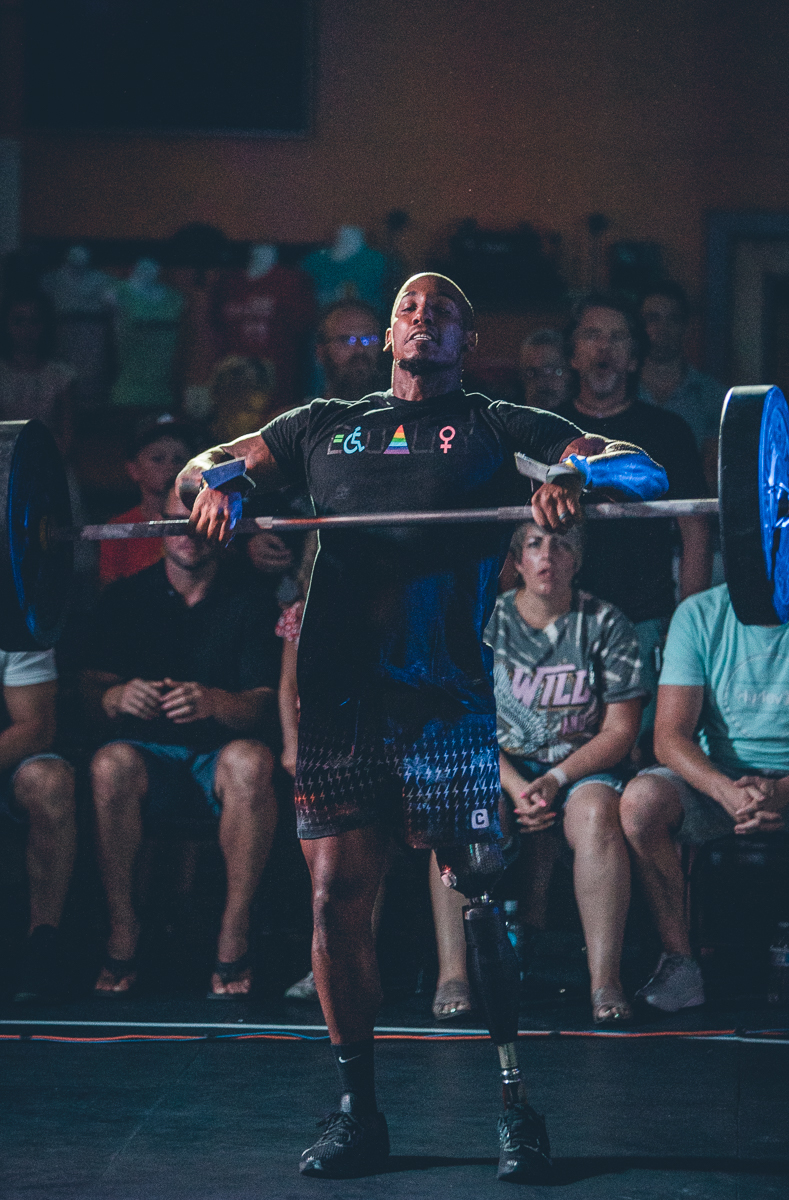Former United States Army Sergeant Marcus Hayward, 36, says he’s nervous about competing in the 2021 CrossFit Games Open.
“I’m trying to lock in my training,” Hayward said, smiling.
Hayward started CrossFit in 2007 while on deployment in Diyala, northern Iraq, and has since competed in well-known competitions like Wodapalooza and The Working Wounded Games. But this will be his first time participating in the worldwide Open.
“I’m excited,” he said. “The sky’s the limit.”
On the heels of CrossFit’s announcement that the 2021 season would include adaptive athlete divisions, Hayward remembered the adaptive athlete exhibition at past Games. He says the community is ready for a legitimate competition.
“I feel like it’s been a long road coming,” he said.
The Injury
While deployed to Khakrez in southern Afghanistan, on July 29, 2010, Hayward was riding in the passenger seat of a Polaris side-by-side ATV when the vehicle ran over a pressure-plate improvised explosive device.
The blast left Hayward pinned under the vehicle, presumed dead, until his comrades heard him moaning. He was transferred by Air Force ParaRescue to Kandahar, Afghanistan, to receive treatment and was forced into a medically induced coma.
“I remember, at best, five seconds of the team medic holding me in his arms, and (I was) literally crying and saying I was done and couldn’t do it anymore,” Hayward said.
Eventually transferred to Landstuhl, Germany, Hayward awoke on Aug. 1, 2010, to realize his left leg had been amputated above the knee.
“Luckily,” Hayward said, “I had some good friends stationed in Germany and Italy who heard I got injured, so when I woke up … they came in and laughed with me, joked with me, tried to get my spirits up.”
Hayward also sustained a traumatic brain injury and severe trauma to his left eye. He underwent several surgeries to start the healing process, which left him with a cadaver cornea, two plates in his face, and a plate in his hand.
The Recovery
By mid-August Hayward was back in the states and starting physical and occupational therapy at Walter Reed Medical Center in Washington, D.C.
“I couldn’t even sit up in bed,” Hayward said of when he started PT.
Hayward’s physical therapist took him to the Military Advanced Training Center, which offers rehabilitating soldiers the latest in cutting-edge equipment, including climbing ropes, a rock wall, parallel bars, and prosthetic-training and skill-training areas to help with recovery. Hayward recalls seeing other wounded veterans climbing and running when his physical therapist told him, “You can do this.”
Around four months after the accident, Hayward returned to functional fitness. His first movements included bench pressing and “lots of seated and stationary movement,” he said. “I was pretty depleted,” he added. “Very skinny.”
When his PT told him he needed to learn how to fall for safety, Hayward was hesitant.
“I was terrified of falling,” he admitted.
He recalls the moment he fell for the first time in front of a group of donors who were observing the wounded soldiers.
“My pride was probably hurt more than anything else,” Hayward laughed. “I fell outside of therapy, so my therapist didn’t have to do an incident report, but she was thrilled because I fell finally.”
Today, a fall is rare for Hayward who is more than comfortable moving his body around his home gym or local affiliate, Crazytrain CrossFit, in West Palm Beach, Florida.
Family and Professional Life
Hayward resides in South Florida with his wife, Elizabeth, who owns a local nail salon; two kids, Macayle, 7, and Mekhi, 2; and two dogs, Ellie and Jada. Ellie, a Belgian Malinois, was Hayward’s working dog while he was on active duty and was with Hayward during the accident.
Hayward’s kids often join him for home workouts.
“My daughter works out with me because she’s being home-schooled right now, and I tell her, ‘You gotta be healthy. Being healthy is super important,'” Hayward said. “My son will grab the 2-lb. dumbbells and do a few floor presses, he’ll pull five times on the rower, he’ll fall to the ground like a burpee and get up a few times … he’ll do his routine, which I think is awesome.”

When he’s not training or spending time with his family, Hayward is helping others as a physical-therapy assistant, a career he was inspired to pursue after his own PT experience.
“After spending close to two years doing therapy to learn to walk again, along with just building overall confidence in myself and my abilities, physical therapy seemed like the perfect job to give back to others,” Hayward said. “And since starting some type of physical fitness while in the Army, I’ve always been in love with the human body and its capabilities.”
What’s Next?
Hayward loves competing. His first competition experience was at The Working Wounded Games at CrossFit Rubicon in November 2014.
“There were probably 50 adaptive athletes there,” Hayward remembered.
He’s also competed at Wodapalooza three times, including once in the inaugural year of the adaptive athlete division in January 2015. In 2016, he competed in the intermediate team division, and in 2018 he competed in the scaled team division — both able-bodied competitions.
“I had a ball,” he said. “I got to compete. I got to meet people. It was a fun time.”

Programming workouts for adaptive athletes is not easy, Hayward said.
“It’s very tricky. It’s very intricate,” he explained. “You can’t just say, ‘We’re gonna have an adaptive athlete division. Go at it.’”
“The stimulus for an upper-extremity athlete compared to the stimulus for a lower-extremity athlete is completely different,” he added.
Hayward hopes to see muscle-ups and handstand push-ups in the 2021 CrossFit Games Open.
But the ultimate goal, Hayward said, is health and longevity.
“We try to live a healthy life and be a healthy household, just for longevity,” he said. “Especially with everything going on right now. If we can get through the pandemic and be healthy, which we’ve been able to do so far, we must be doing something right.”
He added: “Between my faith, being a functional athlete, and my job in the military, it saved my life.”